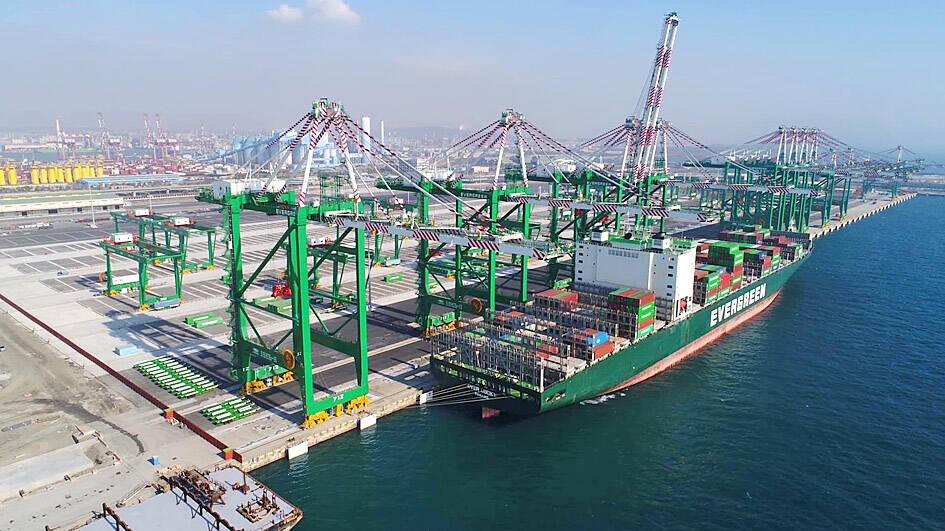The Port of Kaohsiung and Canada's Port of Nanaimo formally became "sister ports" yesterday during the Pacific Ports Conference in Canada, the Taiwan International Ports Corp (TIPC) said.
The Port of Nanaimo is now Taiwan's third sister port in Canada after the Port of Vancouver and Fraser River Port.

Photo courtesy of Taiwan International Ports Corp via CNA
The signing ceremony was attended by TIPC president Wang Chin-jung (王錦榮), Kaohsiung Port Branch harbor master Chen Tsu-chiang (陳祖強), Port of Nanaimo board chair Donna Hais and Port of Nanaimo CEO Ian Marr.
Wang, who became president of the Taiwanese state-owned company last year, said that the sister-port relationship between the Port of Kaohsiung, Taiwan's biggest port, and the Port of Nanaimo, a natural deep-water harbor on Vancouver Island, would "benefit both sides greatly."
He said that the Port of Kaohsiung signed a similar agreement with the Port of Vancouver in 1993, and that over the decades the two ports have maintained close ties.
"In addition to exchanges in many areas such as technology and management, this has been very helpful to the operations of Taiwanese shippers such as Evergreen Marine Corp and Yang Ming Marine Transport Corp," he said.
The US-initiated tariff war was one of the most discussed issues at the conference, Wang said.
According to Wang, tariffs would lead to a reduction of about 500,000 to 550,000 20-foot equivalent units in TIPC's cargo volume, or about 3.8 percent of the total.
However, compared with other countries, Taiwan's economic position and port strength remain "highly resilient and competitive," Wang said.
The conference announced that the Port of Taichung is to host the 2032 annual meeting, following the Port of Kaohsiung last year.
This "not only demonstrates the determination of Taiwan's port group to continue deepening international exchanges, but also highlights Taiwan's soft power in the international port arena," Vancouver Taipei Economic and Cultural Office Director-General Angel Liu (劉立欣) said.

The manufacture of the remaining 28 M1A2T Abrams tanks Taiwan purchased from the US has recently been completed, and they are expected to be delivered within the next one to two months, a source said yesterday. The Ministry of National Defense is arranging cargo ships to transport the tanks to Taiwan as soon as possible, said the source, who is familiar with the matter. The estimated arrival time ranges from late this month to early next month, the source said. The 28 Abrams tanks make up the third and final batch of a total of 108 tanks, valued at about NT$40.5 billion

Two Taiwanese prosecutors were questioned by Chinese security personnel at their hotel during a trip to China’s Henan Province this month, the Mainland Affairs Council (MAC) said yesterday. The officers had personal information on the prosecutors, including “when they were assigned to their posts, their work locations and job titles,” MAC Deputy Minister and spokesman Liang Wen-chieh (梁文傑) said. On top of asking about their agencies and positions, the officers also questioned the prosecutors about the Cross-Strait Joint Crime-Fighting and Judicial Mutual Assistance Agreement, a pact that serves as the framework for Taiwan-China cooperation on combating crime and providing judicial assistance, Liang

A group from the Taiwanese Designers in Australia association yesterday represented Taiwan at the Midsumma Pride March in Melbourne. The march, held in the St. Kilda suburb, is the city’s largest LGBTQIA+ parade and the flagship event of the annual Midsumma Festival. It attracted more than 45,000 spectators who supported the 400 groups and 10,000 marchers that participated this year, the association said. Taiwanese Designers said they organized a team to march for Taiwan this year, joining politicians, government agencies, professionals and community organizations in showing support for LGBTQIA+ people and diverse communities. As the first country in Asia to legalize same-sex

MOTIVES QUESTIONED The PLA considers Xi’s policies toward Taiwan to be driven by personal considerations rather than military assessment, the Epoch Times reports Chinese President Xi Jinping’s (習近平) latest purge of the Chinese People’s Liberation Army (PLA) leadership might have been prompted by the military’s opposition to plans of invading Taiwan, the Epoch Times said. The Chinese military opposes waging war against Taiwan by a large consensus, putting it at odds with Xi’s vision, the Falun Gong-affiliated daily said in a report on Thursday, citing anonymous sources with insight into the PLA’s inner workings. The opposition is not the opinion of a few generals, but a widely shared view among the PLA cadre, the Epoch Times cited them as saying. “Chinese forces know full well that